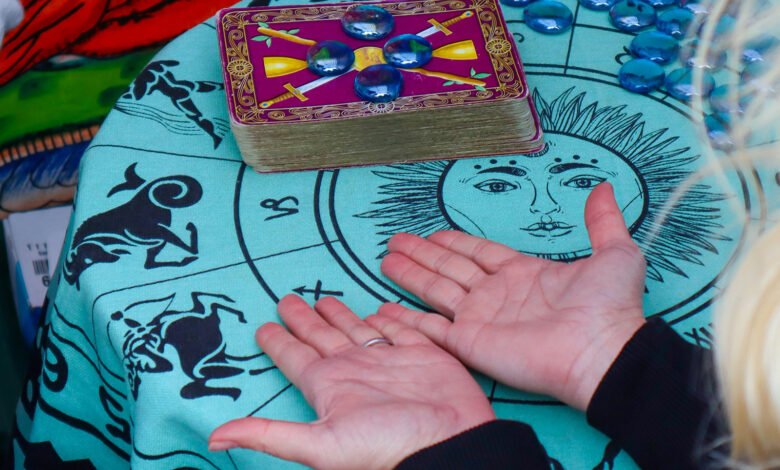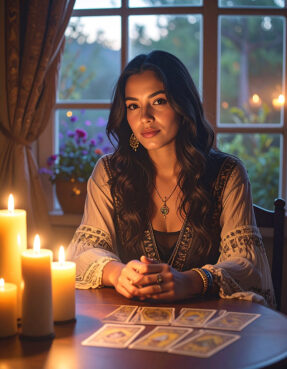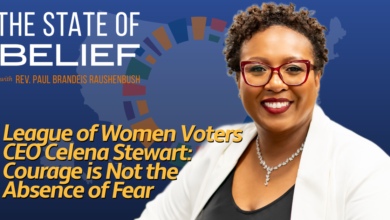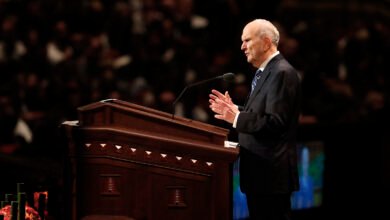Can AI tell your future?

(RNS) — A woman in Greece files for divorce after an AI chatbot reads signs of infidelity in her coffee grounds. A business owner in China types her birth date and location into Chinese artificial intelligence sensation DeepSeek to glean astrological advice on a recent career change. Millennials in Thailand share advice on how to upload pictures of their palms for ChatGPT to read.
In between writing emails, generating grocery lists and summarizing books, AI large language models have found a new use: fortune telling.
Tech tools for religion and spirituality aren’t anything new. Apps track Muslims’ Ramadan fasts, tell Jews if a dish is kosher, furnish Bible quotes of the day or guide a meditation session. Co–Star, an astrology social network app launched in 2017, had 30 million registered users as of July 2023.
Even digital divination isn’t new: Online wheels of fortune will answer your yes/no questions, and on Etsy, a witch will deliver predictions via email or DMs.
What is new is the boom in access to AI for the average user. According to the Pew Research Center, 57% of U.S. adults interact with artificial intelligence at least several times a week, and the use of ChatGPT has increased from 18% of U.S. adults to 23% from July 2023 to March 2024. The largest increase was seen among younger adults, with 43% of adults under 30 saying they have used ChatGPT.
With the proliferation of AI tools for everything from transcription to customer service, it seems inevitable that AI would be used for spiritual tools as well. AI-powered apps such as Seance AI use the technology to give users the feeling of talking to departed loved ones, SeventhSight interprets dreams, while BeautifulSouls offers spiritual guidance from AI “counselors.”

SeventhSight uses AI to interpret dreams. (Screen grab)
RELATED: Pope Leo XIV wants to prioritize AI. He’s using the Vatican’s bioethics think tank to do it.
“I was like, ‘I’m in a pinch. I need answers now,’” said Beverly Yang, who uses ChatGPT to discern the meanings of tarot cards she pulls. She has online tarot guides such as Labyrinthos and Biddy Tarot bookmarked and consults the explanatory booklets that come with each card deck. But the 24-year-old, who lives in Cambridge, Massachusetts, and often finds the guides’ descriptions short and generic, says, “I’ve read (AI results) and gone ‘Dang, this hits.’”
AI has found its way into spirituality even when it’s not requested. “Someone I asked for a reading from on Etsy retroactively told me they made an AI device for it,” said Mimi Zhang, a recent college graduate who both buys tarot readings and does them herself.
Artificial intelligence provider OpenAI allows users to easily create custom versions of ChatGPT for specific purposes, and many are available through OpenAI’s site — the first result under their “lifestyle” category is an Astrology Birth Chart GPT, an “expert astrologer GPT that needs your birth info to answer queries.” A brief search turns up bots for reading Turkish coffee grounds, Korean Saju fortune telling and Vedic divination.

An AI-generated image of a woman with tarot cards. (Image courtesy Pixabay/Creative Commons)
Jade Sykes, astrologer to pop-culture stars such as SZA and Kehlani, runs custom ChatGPT bots that give advice on astrology, astrocartography and a New Age system called Human Design. (Another, a bot that explains cryptocurrency, is cheekily named “CultGPT.”)
AI tarot readings are so common that professional readers regularly face accusations of using the technology. Nyx, an online tarot reader, now videos herself doing readings to demonstrate that her readings are her own. She compares AI readings to AI art. “The realness and creativity behind spiritual workings and readings from gifted people is taken away, so it’s kind of upsetting.”
The presence of AI fortunetellers and spiritual advisers raises the question: Can a soulless machine really divine the future?
Cass Morales, a master of theological studies candidate at Harvard Divinity School, cites incidents where she’ll have sudden insights into what the cards mean for the person requesting the reading. “That’s my frame connecting with the divine — how can ChatGPT do that? It can’t. It’s not alive.”
“I have a pretty high degree of certainty that all of the intellectual things that a human might be able to do, a machine could replicate,” said James Prashant Fonseka, a venture capital investor who has a long history of working with AI startups. “When it comes to connection to a higher power, I have no idea.”
But not everyone expects divination to predict the future anyway; rather they use it to help them reach clarity. While a 2024 Pew Research Center study found that 30% of U.S. adults say they consult astrology, tarot cards or a fortune teller at least once a year, few said they made major decisions based on what they learned.
For many, tarot and other divination methods simply provide a sense of control, not a reading of a concrete future.
“I was in a dark period in my life where I needed answers,” said Alisha Tokee, 24, from New York City. “You have more agency about what you do, what relationships you want to build and what practices you want to build. It changes your relationship with the world and forces you to see and understand things in a different way.”
Zhang, the college graduate, agrees. “It’s really difficult for me to walk into things blindly. Divination is a way for me to feel like there’s at least one stepping stone I can see.”
Morales says that for her, tarot is about relationships. “I’ve made friends through reading Tarot, formed community, and have been able to have deep conversations very quickly with people. I hate when you really want to get to know someone and you’re stuck in this shallow phase. Tarot lets me know what’s going on.”
Similarly, many of those interviewed said their first deck was gifted from a friend, that they learned how to pull and read cards from watching friends and that tarot enabled them to touch on topics that they wouldn’t otherwise discuss. “It creates immediate dialogue,” said Tokee. “You get into serious subjects fast.”
RELATED: Nearly 1 in 3 Americans consult astrology, tarot cards or a fortune teller, Pew study finds
So the question remains — can AI tell fortunes like a human?

(Photo by Mikhail Nilov/Pexels/Creative Commons)
Because AI only “knows” what has already been posted to the web, it can’t tap into the occult sources that fortune tellers have used for centuries. “Knowledge in divination is often passed on secretly, making the best information not available for AI to learn from,” said Jahin, a practitioner in Shenzhen, China, who has been using various Chinese and Western methods, including BaZi, astrology and tarot, for almost 20 years.
Aimee Chen, a tarot user and digital humanities scholar who has several years of experience fine-tuning large language models – the process of further developing a broadly-trained model to perform better on specific tasks or subjects – agreed. The vast amounts of text that train the LLMs to think like a human are so large, “it’s impossible to know what kind of data you’re putting in,” she said.
Knowing how it is put together, said Chen, she’s not likely to use AI for divination.
AI predictions can also be patently wrong: Out of curiosity, Jahin asked an AI chatbot to read the fortune of a newborn; The chatbot said that 2030 was an ideal year for the child to get married — at the age of five. “AI is a mediocre fortune teller at best,” he said.




